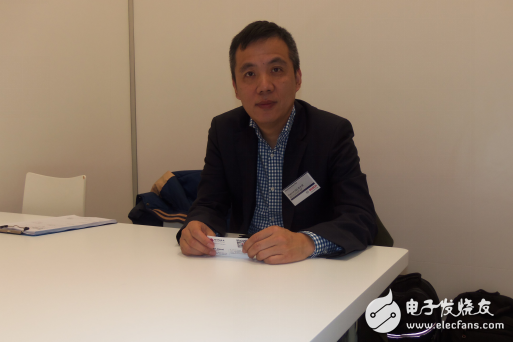According to Gartner's statistical report, the total market for IoT-related products and services will reach 235 billion US dollars. By 2016, the total number of low-international IoT devices will be 6.4 billion, which will increase by 30% compared with 2015. It will grow to 20.8 billion in 2020. The Internet of Things changes the world, and this will be an irreversible trend. It is predicted that in the future, weather data from 29,000 meteorological stations around the world will be received anytime and anywhere. Data centralization, sensors and platformization will be an important trend in the development of the Internet of Things. It is not difficult to find that Bosch has always been at the forefront of MEMS technology since its inception. The product range includes pressure sensors, accelerometers, yaw sensors, and integrated inertial sensors for automotive electronics and consumer electronics. To this end, electronic enthusiasts interviewed Mr. Qu Yonglei, general manager of Bosch Asia Pacific, IoT Equipment Solutions Division for the development platform under the Internet of Things era. Mr. Qu Yonglei, General Manager of Bosch Asia Pacific, IoT Equipment Solutions Division Qu Yonglei said that Bosch began to deploy the Internet of Things three years ago, mainly based on sensor solutions. At present, Bosch can provide IOT services from device to sensing to the cloud, and has been fully covered. The participation in the Munich Electronics Show focused on the cross-disciplinary development kit (XDK) sensor platform, which includes MEMS accelerometers, magnetometers and gyroscopes, as well as humidity, pressure, temperature and acousto-optic sensors in software. Providing a variety of software libraries, by combining hardware and software, is more convenient for developers to quickly develop products. So, how do you view the current situation of the Internet of Things and the development of the Internet of Things on the XDK sensor platform? Qu Yonglei pointed out that the Internet of Things can be viewed from three aspects: First, the platform war has intensified. From Apple HomeKit, Google Brillo and Intel IoTIvity to Qualcomm's AllJoyn, UPnP Forum and ARM, it can be seen that the IoT platform strategy is strengthened and vendors are vying for this market; Second, the sensor becomes the core. The Internet of Things requires sensors to send mobile data to the cloud in the most cost-effective way through wireless technology. The core of the Internet of Things is a variety of sensors, and to a large extent, they are the ultimate means of solving problems; Third, the data is gradually centralized. With the increasing number of IoT devices, weather station products like Netatmo can accept millions of data information at any time, while centralizing all data for processing. Big data processing is an inevitable demand in the Internet of Things era. As the world's leading technology and service provider, Bosch offers innovative and profitable IoT solutions through its products and services. Qu Yonglei pointed out that Bosch's new cross-domain development kit (XDK) is a rapid prototyping tool that helps developers quickly and easily bring their IoT design to life, supports Bluetooth and WiFi connectivity, and includes a microcontroller and integration. Antenna, a micro SD card slot and a rechargeable battery. In turn, there are two main characteristics: First, cross-industry. For different needs of developers, different product solutions can be designed, such as smart home temperature and humidity, industrial 4.0 equipment monitoring and operation, logistics equipment supervision, etc., can be well developed and applied; The second is integration. The XDK sensor development platform integrates a large number of sensors and supports a variety of software that allows users to access API layers and program at specific layers. Developers get a lot of support applications, so that they don't have to think too much about the underlying design of the software, and they focus more on the application layer to meet customer needs. At the same time, Bosch also provides algorithm libraries and sample applications, users can also access the online community for information sharing and project support. The XDK is designed to provide a smooth transition to product prototype vector production by providing users with clear product development ideas. Qu Yonglei also said that the innovation forum held in the same period is also one of the highlights of the Shanghai Electronics Fair in Munich. Professors and experts from universities and enterprises gathered together to discuss the status quo and development trends of the industry and jointly promote electronic suppliers and The interaction between industry customers and build a platform to explore technological innovation. Qu Yonglei concluded that the XDK sensor platform provides a complete software library that developers can call at any time, targeting different design needs of developers, to help developers quickly develop products, and to assist developers in productization and mass production. Achieve long-term cooperative relations. Of course, in the future, Bosch will continue to launch the latest development platform for the needs of different customers in a timely and dynamic market.
As we know, Lithium Battery has many advantages.
Self-discharge is small, under 2% per month (recoverable). No memory effect. The operating temperature range is -20℃ ~ 60℃. Excellent cycle performance, fast charging and discharging, charging efficiency up to 100%, and large output power. Long service life. It does not contain poisonous and harmful substances and is called green battery.
Rechargeable Lithium Battery, Rechargeable Li Battery, Rechargeable Lithium Polymer Battery,Rechargeable Lithium-ion Battery, Renewable Li-ion Battery, Li Battery Backup Shenzhen Enershare Technology Co.,Ltd , https://www.enersharepower.com